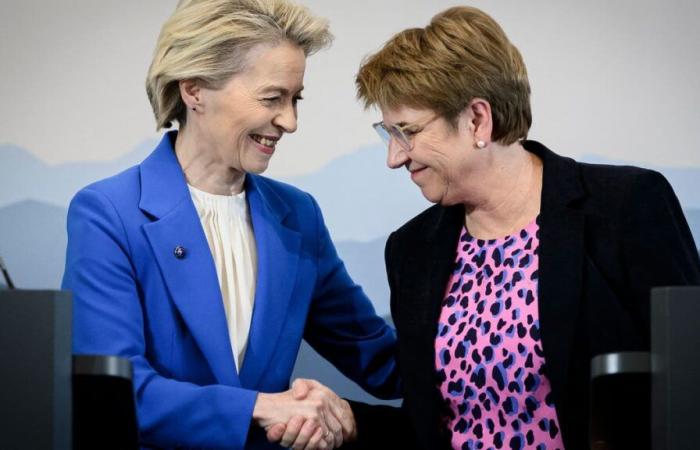EU-PAKET
Comparison to the failed framework agreement: Switzerland has improved this – here it had to give in
The negotiations on the modernization of the bilaterals have been completed. What has changed compared to the failed framework agreement of 2018? Some. Our comparison.
We have a deal: EU Commission President Ursula von der Leyen (left) shaking hands with Federal President Viola Amherd on Friday in Bern.
Bild: Fabrice Coffrini/POOL
At the end of 2018 we had already reached this point: the negotiations on the institutional framework agreement with the EU were successfully concluded. The then EU Commission President Jean-Claude Juncker euphorically spoke of a “friendship treaty”. Three years later, the Federal Council rejected the agreement. There was an angry reaction in Brussels.
To ensure that the total diplomatic loss does not happen again, the negotiating teams led by chief negotiator Patric Franzen have turned over every stone. They knew: This time it had to work. There would be no third attempt.
Now the result is available. What has improved for Switzerland:
Immigration brake – this is how it works
If Switzerland feels that there is a major problem with immigration, it can take protective measures. This could be, for example, introducing immigration quotas.
Switzerland informs the EU Commission in the so-called Joint Committee that there are “serious economic or social problems” due to immigration. If the EU Commission does not agree to this, Switzerland can involve the joint arbitration tribunal. This checks whether there is actually a problem. If this is the case, Switzerland receives the green light for the measures. These must be proportionate.
There is a due process and a quick process. In the latter case, Switzerland can take protective measures after just thirty days if the arbitration tribunal agrees. Switzerland has yet to define what serious problems mean. High unemployment figures or many people receiving social assistance from the EU as well as distortions in the rental market are conceivable.
By the way: It is not possible to come to Switzerland from the EU to receive social assistance. If someone becomes unemployed and does not make any effort to find a job again, their residence permit can also be revoked.
Electricity, health, food safety – three new agreements
In order to spice up the framework agreement, the Federal Council has added three new agreements. The most important thing is the electricity agreement. It will bring Switzerland more security of supply and tend to lower prices. Switzerland should become Europe's battery with its hydroelectric power plants. Barriers to food safety are being reduced so that agricultural products can circulate more easily. This prevented Swiss animal protection from being lowered or genetically modified foods from entering the country. The health agreement enables, among other things, smooth cooperation should a pandemic break out.
Research collaboration is secured
Switzerland's participation in the world's largest research program “Horizon Europe” is to be secured with its own agreement. This means that researchers in Switzerland are no longer caught between the two fronts as they were in the past. From January 1, 2025, the EU will allow Switzerland to participate fully again.
Switzerland gets market access without needlesticks
The reason why the Federal Council is doing the whole exercise: It's about making the bilateral agreements and Switzerland's access to the European market fit. To achieve this, Switzerland must make certain concessions (see below). In return, she receives legal certainty. There should no longer be any pinpricks such as the withdrawal of Swiss stock exchange equivalence or the failure to update product recognition. But be careful: Switzerland will only receive both the update of the important product agreement and the definitive integration into EU research once the referendum has been passed. Until then, the EU will retain the leverage.
No more free trade agreement in 1972
The EU wanted to integrate and modernize the 1972 free trade agreement. It was mentioned in an appendix to the framework agreement. Switzerland doesn't want this because, among other things, certain cantonal tax practices could come under pressure. Now the free trade agreement is gone.
And here Switzerland had to give in:
The “foreign judges” cannot be avoided
The new EU package is expected to go to the ballot box in 2028. The Swiss can reject the new agreements on electricity, food safety and health, but the EU doesn't care. All that matters to them is that the core component of the package gets through: the adoption of European law in the area of the internal market. And the arbitration mechanism if there is a dispute. A joint arbitration tribunal will come into play here. If an unresolved question arises about the application of EU law, the matter must be referred to the European Court of Justice (ECJ) in Luxembourg. Its interpretation is binding. Since Switzerland, as a non-EU country, is not represented in Luxembourg, critics such as the SVP speak of “foreign judges”. Whereby: They can also rule in favor of Switzerland.
No subsidyitis
Switzerland promises not to grant aid that distorts competition. To do this, she creates a new authority. The agreements on land transport, air transport and electricity are covered. In the latter, however, Switzerland was able to secure important exceptions.
Concessions in wage protection
In order to make the expanded Swiss wage protection EU compatible, adjustments had to be made. For example, the registration period for posted workers has been reduced from eight to four days. What is particularly worth talking about is the rule according to which EU workers can be compensated for lower expenses. This could not be negotiated away as the rule itself is controversial in the EU. Many people simply don't stick to it. Switzerland could do the same or take other compensation measures domestically.






